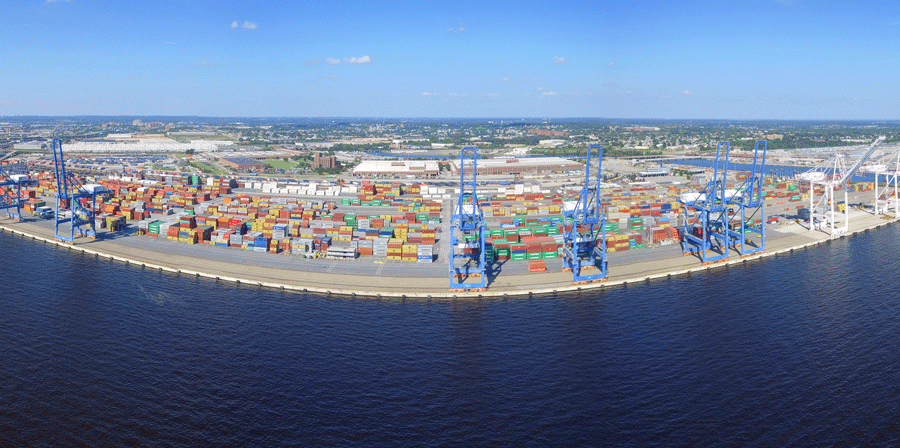In March 2024, the collapse of the Francis Scott Key Bridge in Baltimore, Maryland, sent shockwaves through the supply chain and transportation management industry, underscoring the critical need for robust contingency plans and resilient supply chains in today's interconnected global economy.
Supply chain disruptions, whether caused by natural disasters, geopolitical events, or infrastructure failures, can have far-reaching impacts on businesses, economies, and communities worldwide. This article aims to explore strategies for mitigating supply chain disruptions and building resilience, drawing insights from the Francis Scott Key Bridge collapse and other real-world examples.
Understanding Supply Chain Disruptions
Supply chain disruptions refer to any event or circumstance that interrupts the flow of goods, services, or information within a supply chain network. These disruptions can arise from a variety of sources, including natural disasters such as earthquakes, hurricanes, or floods; geopolitical tensions leading to trade restrictions or embargoes; and infrastructure failures like transportation accidents or system breakdowns.
The Francis Scott Key Bridge collapse serves as a poignant example of how a single incident can disrupt the entire supply chain ecosystem, causing delays, disruptions, and economic losses for businesses and stakeholders involved.
Importance of Contingency Planning
Effective contingency planning is essential for mitigating the impact of supply chain disruptions and ensuring business continuity. Contingency plans outline predefined actions and strategies to be implemented in response to various disruption scenarios, allowing organizations to respond swiftly and effectively when crises occur. Key components of effective contingency plans include:
- Risk Assessment: Identifying potential risks and vulnerabilities within the supply chain, evaluating their potential impact, and prioritizing mitigation efforts based on risk severity.
- Scenario Planning: Anticipating and preparing for various disruption scenarios through scenario-based simulations and tabletop exercises, enabling organizations to test their response strategies and refine their contingency plans.
- Communication Protocols: Establishing clear communication channels and protocols for disseminating information, coordinating response efforts, and engaging stakeholders both internally and externally during disruptions.
- Proactive Approach: Adopting a proactive rather than reactive approach to disruptions, focusing on prevention, preparedness, and resilience-building measures to minimize the impact on operations and supply chain performance.
Strategies for Building Supply Chain Resilience
- Diversification of Suppliers and Transportation Modes
Diversifying supplier and vendor networks is critical for reducing reliance on a single source of supply and mitigating the risk of disruptions. By sourcing materials or components from multiple suppliers across different regions or countries, organizations can minimize the impact of localized disruptions and maintain continuity in their supply chains.
Similarly, diversifying transportation modes, including air, sea, rail, and road, provides flexibility and redundancy in logistics operations, allowing organizations to adapt quickly to changing conditions and disruptions in any single mode of transportation.
For example, in the aftermath of the Francis Scott Key Bridge collapse, businesses that diversified their transportation modes were better equipped to mitigate the impact of the disruption by rerouting shipments through alternative routes or modes of transport, thereby minimizing delays and disruptions in their supply chains.
- Adoption of Advanced Technology Solutions
Leveraging advanced technology solutions is instrumental in improving supply chain visibility, responsiveness, and resilience. Technologies such as Internet of Things (IoT) sensors, blockchain, artificial intelligence (AI), and predictive analytics enable organizations to monitor and track supply chain activities in real-time, anticipate potential disruptions, and make data-driven decisions to mitigate risks and optimize operations.
For instance, IoT sensors can provide real-time monitoring of inventory levels, equipment performance, and environmental conditions throughout the supply chain, enabling organizations to detect and respond to disruptions proactively. Similarly, blockchain technology offers enhanced transparency, traceability, and security in supply chain transactions, reducing the risk of fraud, counterfeiting, and supply chain disruptions.
- Strengthening Partnerships and Collaboration
Strong relationships with suppliers, logistics partners, and other stakeholders are essential for building resilient supply chains. Collaborative partnerships foster trust, transparency, and mutual support among supply chain participants, enabling organizations to share information, resources, and best practices to mitigate risks and address disruptions collectively.
For example, during the Francis Scott Key Bridge collapse, businesses that had established strong partnerships with their logistics providers and transportation carriers were able to collaborate effectively to find alternative routes, modes of transport, or temporary storage solutions to minimize the impact of the disruption on their supply chains.
- Inventory Management and Demand Forecasting
Optimizing inventory management practices and demand forecasting processes is crucial for balancing supply and demand dynamics and reducing supply chain vulnerabilities. Adopting lean inventory practices, such as just-in-time (JIT) inventory management and vendor-managed inventory (VMI) arrangements, helps organizations minimize excess inventory holding costs while ensuring adequate stock levels to meet customer demand.
Effective demand forecasting techniques, supported by data analytics and historical trends analysis, enable organizations to anticipate fluctuations in demand, identify emerging trends, and align production and inventory levels accordingly. By maintaining optimal inventory levels and accurately forecasting demand, organizations can mitigate the risk of stockouts, shortages, and disruptions in their supply chains.
- Building supply chain resilience requires a multifaceted approach encompassing diverse strategies and initiatives. Some key strategies for enhancing supply chain resilience include:

Alternative Freight Solutions for Container Shipping
In addition to contingency planning and collaboration with logistics partners, businesses can explore alternative freight solutions for container shipping to mitigate the impact of disruptions on their supply chains. These alternative solutions offer flexibility and redundancy, allowing organizations to adapt quickly to changing circumstances and maintain continuity in their operations.
- Intermodal Transportation
Intermodal transportation involves the use of multiple modes of transportation, such as rail, road, and sea, within a single journey. By leveraging intermodal transportation, businesses can diversify their freight shipping routes and reduce reliance on any single mode of transport, thereby minimizing the risk of disruptions caused by infrastructure failures, congestion, or other issues.
For example, in the event of a port closure or congestion, organizations can use intermodal transportation to reroute shipments to alternative ports or inland terminals, ensuring timely delivery of goods to their final destinations. Similarly, intermodal transportation offers cost savings and environmental benefits by optimizing route efficiency and reducing carbon emissions.
- Multimodal Shipping
Multimodal shipping combines different modes of transportation, such as sea, air, rail, and road, within a single supply chain journey. By integrating multiple transportation modes, businesses can achieve greater flexibility, reliability, and efficiency in their shipping operations, while mitigating the risk of disruptions associated with any single mode of transport.
For instance, organizations can utilize multimodal shipping to seamlessly transition between air and sea freight for international shipments, depending on factors such as urgency, cost, and destination. This flexibility allows businesses to optimize their shipping routes and delivery schedules, while minimizing transit times and transportation costs.
- Rail Freight Corridors
Rail freight corridors are dedicated routes or networks for transporting goods by rail over long distances. Rail freight offers several advantages, including lower costs, greater capacity, and reduced carbon emissions compared to road transportation. By utilizing rail freight corridors, businesses can bypass congested highways, mitigate the risk of trucking-related disruptions, and achieve faster transit times for long-haul shipments.
For example, organizations can leverage rail freight corridors to transport containerized goods between inland terminals and coastal ports, connecting major manufacturing hubs with key distribution centers. This intermodal approach combines the efficiency of rail transportation with the flexibility of container shipping, providing a reliable and cost-effective solution for domestic and international trade.
- Air Freight Charters
In situations where speed is of the essence, air cargo freight charters offer a premium solution for urgent or time-sensitive shipments. Air freight charters involve the dedicated use of cargo aircraft to transport goods directly from origin to destination, bypassing traditional air cargo networks and transit hubs.
While air freight charters entail higher costs compared to other modes of transportation, they offer unparalleled speed and reliability, making them ideal for mitigating disruptions and meeting tight delivery deadlines. Businesses can utilize air freight charters to transport critical goods during emergencies, natural disasters, or supply chain disruptions, ensuring continuity in their operations and minimizing the impact on customer satisfaction.
- Collaborative Logistics Platforms
Collaborative logistics platforms facilitate the sharing of transportation resources, infrastructure, and capacity among multiple stakeholders within a supply chain network. By participating in collaborative logistics initiatives, businesses can optimize asset utilization, reduce empty miles, and improve overall supply chain efficiency.
For instance, collaborative logistics platforms enable shippers to share truckloads, container space, or warehouse capacity with other companies, thereby reducing transportation costs and carbon emissions. By pooling resources and collaborating with partners, organizations can enhance their supply chain resilience, streamline operations, and mitigate the impact of disruptions on their shipping activities.
How a 3PL like Jillamy Can Help
In addition to implementing the aforementioned strategies, businesses can also leverage the expertise and resources of third-party logistics (3PL) providers like Jillamy to enhance their supply chain resilience. Jillamy offers a comprehensive suite of services aimed at optimizing supply chain operations and mitigating disruptions:
- Diverse Network of Partners: Jillamy typically has an extensive network of partners, including carriers, warehouses, and suppliers. This network provides businesses with access to alternative sourcing options and transportation routes, allowing for quick adjustments during disruptions.
- Advanced Technology Solutions: Jillamy invests in advanced technology solutions such as supply chain management software and real-time tracking systems. These tools enhance visibility and enable proactive decision-making, helping businesses identify disruptions early and respond swiftly.
- Strategic Inventory Management: Jillamy can assist businesses in optimizing their inventory management practices, including implementing just-in-time inventory systems and vendor-managed inventory arrangements. This ensures that inventory levels are optimized for flexibility while minimizing excess stock.
- Flexible Warehousing Solutions: Jillamy offers flexible warehousing solutions tailored to the needs of businesses. Whether it's short-term storage during disruptions or long-term warehousing needs, Jillamy can provide scalable and adaptable space to accommodate fluctuations in demand or supply.
- Customized Transportation Services: Jillamy provides customized transportation services, including multi-modal transportation options. By leveraging a variety of transportation modes such as air, sea, rail, and road, businesses can diversify their transportation options and reduce the impact of disruptions in any single mode.
- Responsive Customer Support: Jillamy's dedicated customer support team is available to assist businesses during disruptions, providing timely updates and offering proactive solutions to minimize disruptions and ensure continuity of operations.
- Risk Management Expertise: Jillamy has expertise in risk management and contingency planning. By partnering with Jillamy, businesses can benefit from proactive risk assessment and contingency planning services, helping them prepare for and mitigate the impact of potential disruptions.
Overall, by leveraging the services of a 3PL like Jillamy, businesses can gain the agility and flexibility needed to effectively navigate disruptions in their supply chains. Whether it's through access to a diverse network of partners, advanced technology solutions, flexible warehousing and transportation options, or proactive risk management expertise, Jillamy can help businesses adapt quickly to changing circumstances and maintain continuity of operations.
Conclusion
In conclusion, navigating supply chain disruptions requires a holistic approach that encompasses contingency planning, diversification, technology adoption, collaboration, and partnership with experienced logistics providers like Jillamy. By implementing these strategies and leveraging the expertise of 3PLs, organizations can enhance their supply chain resilience, mitigate the impact of disruptions, and ensure business continuity in an increasingly volatile and uncertain business environment.
For inquiries about how Jillamy can help optimize your supply chain and navigate disruptions effectively, please contact us.


